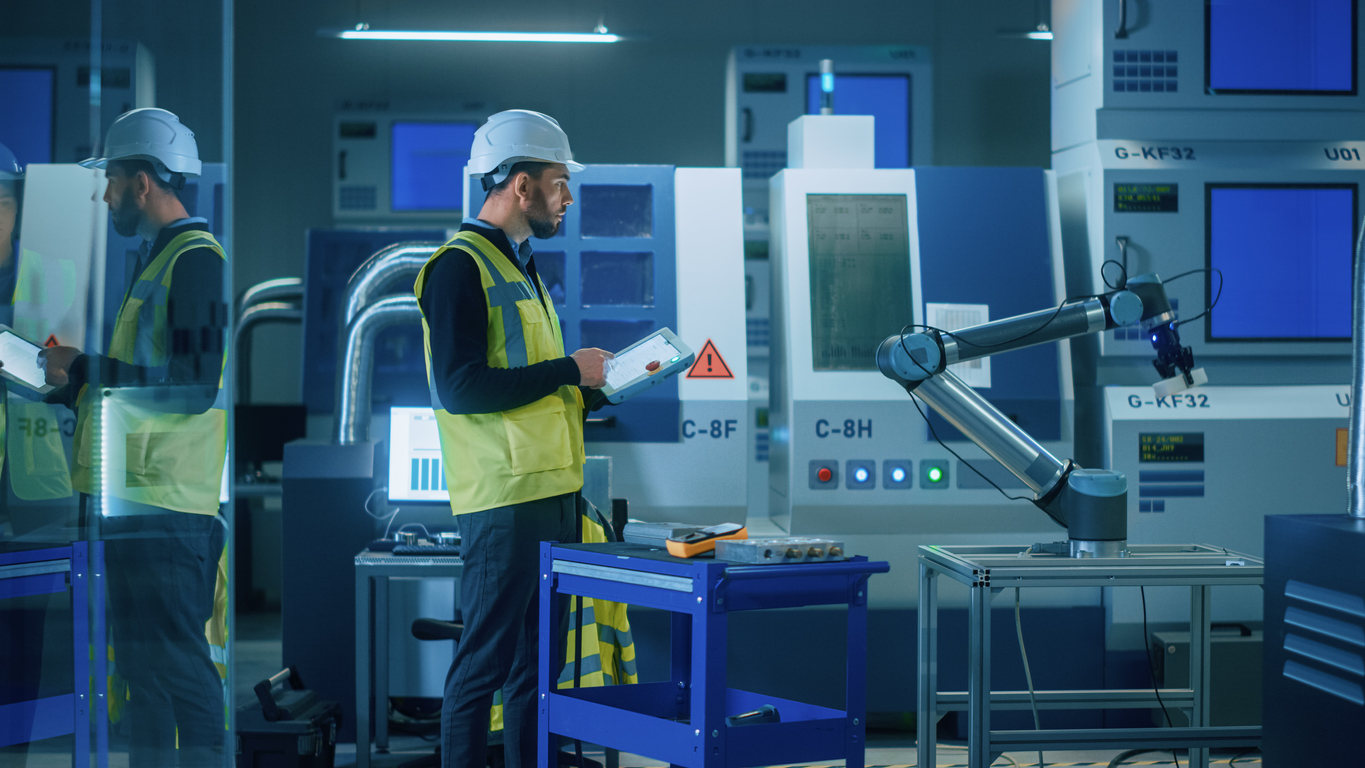Contact Us Today
For your CNC Turning and Milling Services!
Contact Us
The use of industrial robots has seen a boom in recent years and is expected to continue to grow. They have become an integral part of many manufacturing processes, whether used alongside humans to perform specific tasks or to allow companies to run operations lights out. CNC machining takes a prominent role in the manufacturing of industrial robots. Working with the right precision contract manufacturer is critical for the longevity of your robotic investments.
The global market for industrial robotics is expected to grow from nearly $16 Billion in 2022 to more than $30 Billion in 2027 (a 96% increase), growing at a CAGR of 14.3%. This growth is partly driven by the labor shortage that is being felt across industries. In addition, using robots and cobots increases productivity, improves product quality, and streamlines production operations. With so much invested, manufacturers should take care to use quality components to prevent premature failure or manufacturing difficulties that may cost them more.
The third industrial revolution (industry 3.0) brought us computers in the 1970s and the use of automated systems on production lines using Programmable Logic Controllers (PLC), which relied heavily on human input. This paved the way for industry 4.0, which introduced artificial intelligence, cloud computing, and the Internet of Things (IoT), allowing manufacturing processes to run autonomously and exchange information with other systems without human interaction. Industry 5.0 has already begun, some argue, accelerated by the pandemic. Industry 5.0 is expected to see a convergence of human creative thinking with the speed and skill of automation. The European Union says it takes industry beyond the goals of efficiency and productivity of Industry 4.0 and reinforces the role and contribution of industry to society. It is a human-centric, sustainable approach that respects the earth’s production limits. Robots are critical components for both industry 4.0 and 5.0.
As we move into industry 5.0, you may hear the term cobots used more frequently than industrial robot. Industrial robot is the overarching term. Simply stated, it is a programmable machine that uses provided input to perform tasks automatically. A cobot (collaborative robot) is an industrial robot designed to work side-by-side with a human. These machines will sense contact with a human and cease operation, requiring minimal or no safety fencing. However, they tend to be smaller and lighter than traditional robots. Other industrial robots include:
The main components of a robot include a controller, drive train, manipulators, end-effectors, and sensors. The controller is the brain or computer and contains hardware and software. The drive train provides the power for movement. Manipulators are the joints or mechanical linkages of the robotic arms that move in various directions depending on the type of robot. End-effectors are at the end of the arm and help it to carry out tasks. Similar to hands, they are used to pick up components or perform other functions such as welding, marking, cleaning, etc. Sensors are feedback devices that monitor processes, such as sensing the robotic arm’s position. These may include cameras or microphones.
With such precision and accuracy required by robots, it isn’t hard to understand why many parts of these components need tight tolerances, low surface friction, and durable materials. CNC machining is often the best choice for manufacturing these types of parts. Some robot parts produced by CNC machining include joints, gears, bearings, shafts, fasteners, and brackets. Diverse materials can be machined precisely and efficiently, allowing for the creation of lightweight robots.
Another benefit of CNC machining is that it creates parts that fit together perfectly, which is critical for many components, and ensures that the last part manufactured is the same as the first. It can also create complex shapes that might be difficult to manufacture with other methods. With its flexibility, efficiency, accuracy, and precision, CNC machining is an essential part of the robotics industry.
We specialize in CNC machining, assembly, soldering and brazing, and provide engineering support for the robotics industry. Since 1978, our experienced engineers, CNC machinists, and assemblers have prided themselves in delivering high-quality tight-tolerance metal parts and have the quality certifications and capabilities to provide premium robotic parts.
If you’re looking for a trusted custom parts manufacturer to streamline your robotic manufacturing needs, we’d love to help.
Contact us for a quote.